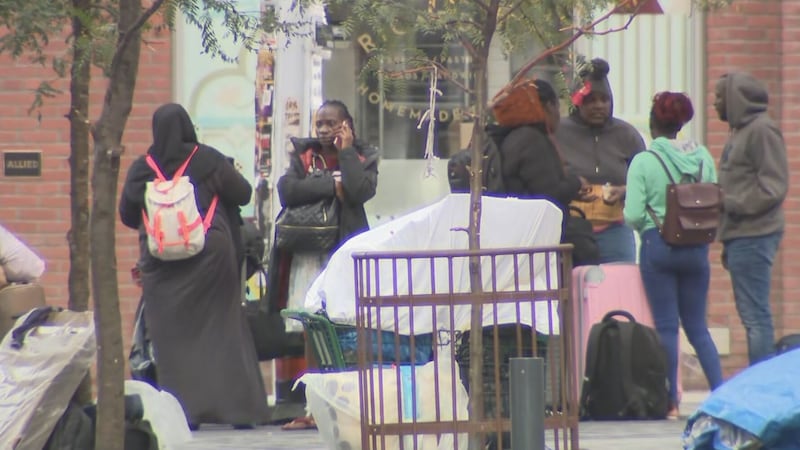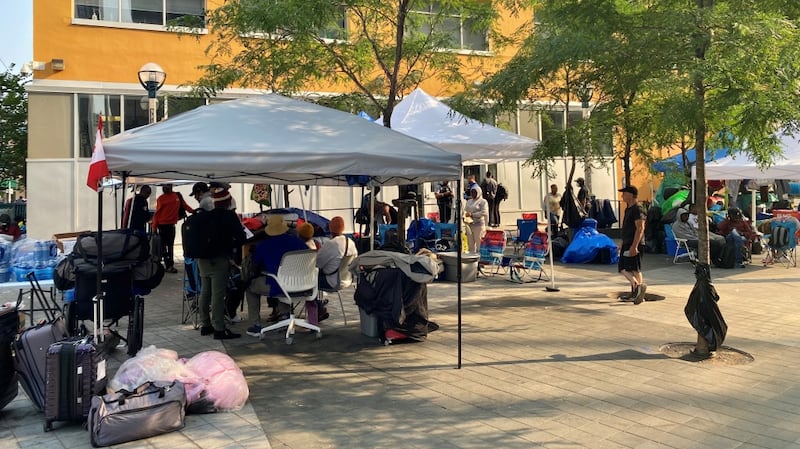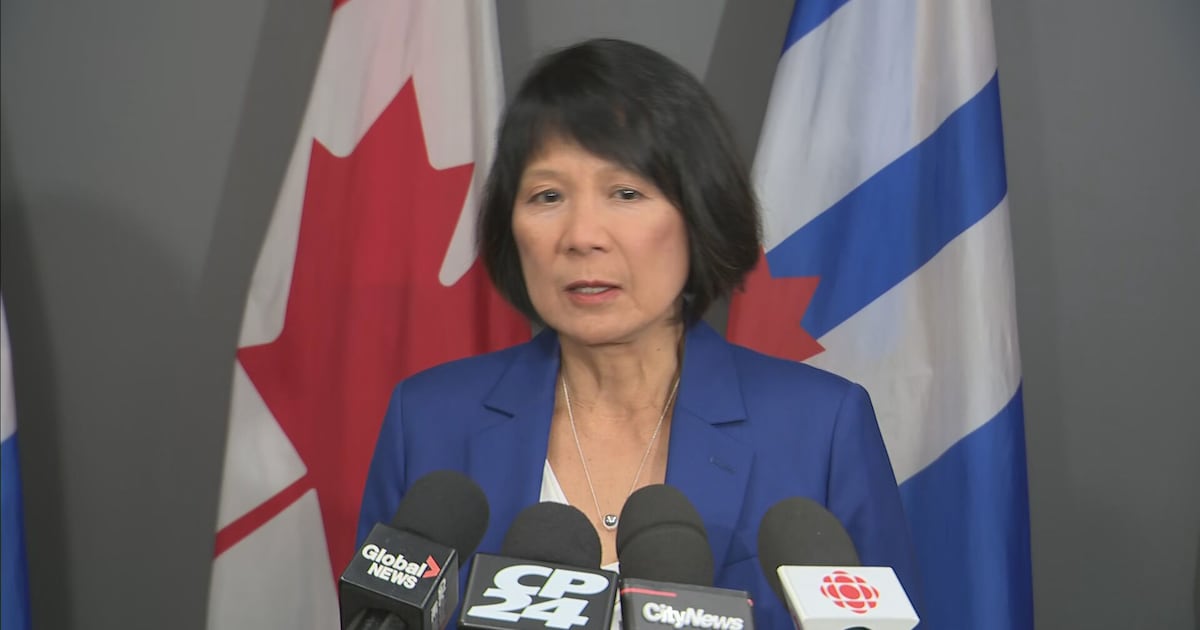Toronto Mayor Olivia Chow is speaking out after recently learning that the federal government plans to only provide a quarter of the funding the city requires to cover the costs of providing interim housing for refugees and asylum seekers.
In a letter addressed to her City Council colleagues, Chow said the feds notified the City of Toronto that they would be paying out only 26 per cent of what Toronto projects to spend on shelter costs for refugees and asylum seekers in 2025.
In the note, Chow suggests that the shortfall amounts to a “cut.”
Federal government officials, however, have said that the demand for its grant program simply exceeded the funding that had been allocated to it.
“As a result of this funding cut through the Interim Housing Assistance Program (IHAP), the city is facing a projected $107 million shortfall this year, which is equivalent to more than a 2 per cent property tax increase,” Chow wrote in her letter, which was obtained by Newstalk 1010.
“As you know, providing safe shelter for refugee claimants is a federal responsibility and the city and province cannot shoulder the cost.”
 Refugees outside 129 Peter Refugee claimants and asylum seekers gather outside Toronto’s Central Intake centre at 129 Peter St. on Oct. 5. (Ken Enlow/CP24)
Refugees outside 129 Peter Refugee claimants and asylum seekers gather outside Toronto’s Central Intake centre at 129 Peter St. on Oct. 5. (Ken Enlow/CP24)
Speaking further on the issue at Toronto City Hall on Thursday afternoon, Chow said it remains unclear at this time how the money that the city has already mostly spnt to support refugees would be recuperated, if that would entail a property tax hike. That possibility, she said, would be discussed this fall when the budget cycle gets underway and a decision would be reached by February 2026 when the budget is finalized.
The mayor went on to say that she has been in communication with the Minsters of Immigration and Finance about the “serious problem” the city will face if it doesn’t get a significant amount of the IHAP funding it requested.
“It’s money that we mostly have spent. This is end of August and we are 3,500 plus refugees in our shelter system. I want to remind everyone that Toronto is built and shaped by successive wave of refugees,” Chow said.
“It is a federal responsibility, and the city, through our property tax base, do not have the financial might to provide shelter. We’re doing it anyway, but it is a problem.”
Chow the city wants to bring in people who are staying in camps in tents, parks and ravines, but can’t do that without more help from the federal government to support refugees.
She noted that telling refugees to leave shelters is not an option for the city.
“They’re leaving war, famine, persecution, all of those, so we can’t just leave them out in on the street. We have to do something,” the mayor said.
During her remarks, Chow also spoke at length about a “very productive” meeting she had on Thursday morning with Canada’s Housing Minister Gregor Robertson about their “common goal to build more affordable homes faster,” notably much-needed housing accelerator funds Toronto requires to achieve its goal of approving 65,000 new units by 2030 as well as the federal government’s request to build six-plexes throughout the city.
She said they also discussed the province’s recently approved plan to build 1.5 million homes in Toronto over the next 25 years as well as investments in infrastructure and public transit.
“We did not talk specifically about cutbacks or anything of that nature,” she told reporters.
Federal program is Toronto’s main source of funding for supporting refugees
This IHAP program, which has recently been transformed into a grant model, has been the City of Toronto’s main source of funding for its refugee response since 2017.
In February, it submitted a grant request to Immigration Refugees and Citizenship Canada (IRCC) for $671 million. The city received its grant offer on Aug. 1 and has until Aug. 25 to accept it.
A briefing note by Toronto Shelter & Support Services (TSSS) attached to Chow’s letter further outlined the operational impacts of this funding shortfall.
Noting that the funding offered represents only 39 per cent of the city’s original ask from January 2025 to March 2027, TSSS said since Sept. 2021 the number of refugee claimants accommodated by the city has increased more than 11 times from 530 a night then to 6,490 at its peak on Aug. 20, 2024.
As of August 8, there are 3,528 refugee claimants in Toronto’s shelter system, which is roughly 40 per cent of the total number of shelter clients, it indicated.
“Although this is the lowest proportion since 2022, Toronto continues to provide emergency shelter to significantly more refugee claimants than any other municipality in Canada,” the briefing note said.
The 2025 funding shortfall is equal to approximately 1,800 beds across the shelter system, which is about 25 per cent of beds provided by 38 community partners, TSSA said.
“It is not possible for the city to immediately stop providing shelter to refugee claimants already in the system and to those claimants who are homeless,” the division said, noting that the city will have to stop or delay some of its shelter transition and program improvements and in turn will result in refugee claimants staying longer in the system among other challenges.
 peter street Refugees camp outside of a shelter intake centre on Peter Street in Toronto (Craig Wadman).
peter street Refugees camp outside of a shelter intake centre on Peter Street in Toronto (Craig Wadman).
Chow, in her letter, pointed to an unanimously adopted motion passed at the Ontario Big City Mayors meeting this week that calls on the federal government to “fund the shelter cost for refugee claimants and asylum seekers at no less than 95% of costs incurred by the City to deliver this vital service.”
She encouraged her colleagues to “echo this request with your federal counterparts.”
The mayor went on to say that the shortfall comes at a time that 3,500 refugee claimants and asylum seekers are relying on Toronto’s emergency shelter system.
“Our city is a beacon of hope for many around the world, which is why so many arrive in Toronto every day with hope for building a better life for themselves and their families,” she wrote in the note.
“Once again, let’s work together to give a good start in Canada for those who are fleeing war, famine and persecution – and get the message out that the federal government must not walk away from their responsibility to provide the funds to do so.”
Refugee crisis emerged in the spring of 2023
The refugee crisis first emerged in the spring of 2023 when hundreds of asylum seekers and refugee claimants arrived in the GTA. Dozens ended up sleeping on the pavement outside Toronto’s Central Intake site at 129 Peter St. in the hope that they might get a bed in a city-run shelter.
This situation was further exacerbated by the City of Toronto’s now-reversed decision to turn away African refugees from its emergency shelter system and refer them to federal programs. This move that was heavily criticized in a scathing report by Ombudsman Toronto, which found that the city’s actions lacked fairness and caused harm, and that it erred in its decision-making and implementation process.
In a statement provided to CP24, Immigration, Refugees and Citizenship Canada indicated that there was significant interest in its grant program with more funding requests than money.
“Grant amounts were largely based on the information applicants provided about their demonstrated need, cost-effectiveness, and the expected results of their projects,” the ministry said.
Feds say they have given municipalities $1.5 billion for refugees since 2017
Immigration Refugees and Citizenship Canada explained that while the program initially focused on short-term emergency measures like shelters and hotels, it is now operating under a “renewed … model (that) prioritizes cost-effective, sustainable solutions and long-term capacity building across Canada.”
“We remain committed to working with provinces, territories, municipalities and stakeholders to support asylum claimants effectively,” it said.
The federal government has said that it has provided municipalities with $1.5 billion to offset the costs of shelter refugees and asylum claimants since 2017, including nearly $670 million to the City of Toronto.
Chow is expected to speak further on this issue at 1:30 p.m. today at Toronto City Hall.

